

Moral theories at a glance. Unlocking the Science of How Kids Think: A new proposal for reforming teacher education. In 2002 I was invited to give a talk to 500 school teachers.
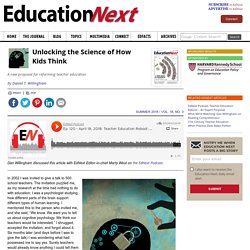
The invitation puzzled me, as my research at the time had nothing to do with education; I was a psychologist studying how different parts of the brain support different types of human learning. I mentioned this to the person who invited me, and she said, “We know. We want you to tell us about cognitive psychology. We think our teachers would be interested.” I shrugged, accepted the invitation, and forgot about it. But it wasn’t. Yet the following 15 years have shown that experience was not a fluke. What Should Teachers Know? Is my experience representative? But perhaps when teachers say they “know how children learn,” they are not talking about learning from a scientific perspective but about craft knowledge. Most education researchers disagree, and they offer a reasonable argument. Whether for this reason or others, most teacher-education programs require some coursework in educational psychology.
Reform in Teacher Education. Sudbury Valley School and Unschoolers: We Are Closer Than You Think — John Holt GWS. The divisive nature of our culture and politics has made everything hard to discuss without falling into absolutist positions, but I was particularly disappointed when I read Dan Greenberg’s essay “Let’s Be Clear: Sudbury Valley Schools and Unschooling Have NOTHING in Common.”
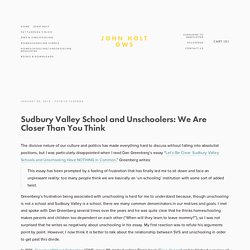
Greenberg writes: This essay has been prompted by a feeling of frustration that has finally led me to sit down and face an unpleasant reality: too many people think we are basically an ‘un-schooling’ institution with some sort of added twist. Greenberg’s frustration being associated with unschooling is hard for me to understand because, though unschooling is not a school and Sudbury Valley is a school, there are many common denominators in our motives and goals. I met and spoke with Dan Greenberg several times over the years and he was quite clear that he thinks homeschooling makes parents and children too dependent on each other (“When will they learn to leave mommy?”) About FHI - Future of Humanity Institute. FHI is a multidisciplinary research institute at the University of Oxford.
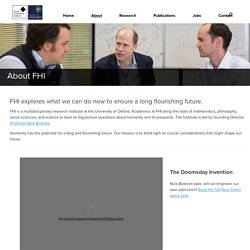
Academics at FHI bring the tools of mathematics, philosophy, social sciences, and science to bear on big-picture questions about humanity and its prospects. The Institute is led by founding Director Professor Nick Bostrom. Humanity has the potential for a long and flourishing future. Our mission is to shed light on crucial considerations that might shape our future. Excellence Researchers at the Future of Humanity Institute have originated or played a pioneering role in developing many of the concepts that shape current thinking about humanity’s deep future.
Partnerships We work closely with the Centre for Effective Altruism, DeepMind, OpenAI, the Machine Intelligence Research Institute, the Leverhulme Centre for the Future of Intelligence and the Cambridge Centre for the Study of Existential Risk. Collective intelligence. Types of collective intelligence Collective intelligence is shared or group intelligence that emerges from the collaboration, collective efforts, and competition of many individuals and appears in consensus decision making.
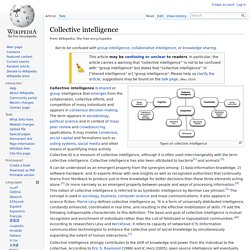
The term appears in sociobiology, political science and in context of mass peer review and crowdsourcing applications. It may involve consensus, social capital and formalisms such as voting systems, social media and other means of quantifying mass activity. Collective IQ is a measure of collective intelligence, although it is often used interchangeably with the term collective intelligence. Collective intelligence has also been attributed to bacteria[1] and animals.[2] Collective intelligence strongly contributes to the shift of knowledge and power from the individual to the collective. History[edit] Theories about groups. Explanations > Theories > Theories about groups Here are academic theories about how groups behave.
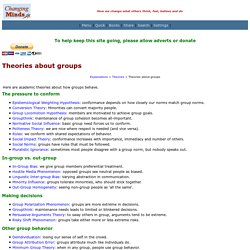
The pressure to conform Epistemological Weighting Hypothesis: conformance depends on how closely our norms match group norms. Conversion Theory: Minorities can convert majority people. Group Locomotion Hypothesis: members are motivated to achieve group goals. In-group vs. out-group In-Group Bias: we give group members preferential treatment.
Making decisions Group Polarization Phenomenon: groups are more extreme in decisions. Le changement de culture d’une Organisation est une opération complexe, multiforme qui nécessite pas mal d’énergie : en cela le terme de Transformation me va mieux et sonne plus juste.

Cette transformation peut évidemment s’approcher sous différents angles… le hacking est l’un d’entre eux, une forme différente, détournée voire même virale, ultra pertinente quand il s’agit de changer, d’améliorer, ces éléments culturels du quotidien. Le syndrôme de la réunionite ! Comme vous pouvez le constater quotidiennement, la « réunion » est un symbole culturel très fort, voir même devenir une véritable passion ! Salutaire… parfois et finalement pas si difficile à hacker ! Donc si vos réunions constituent de vraies sources d’insatisfaction ou sont synonymes de perte de temps, du genre : Tiens si on faisait une « petite » réunion pour régler ça !
Heady Stuff. Individuation. Systemic. Peopled Experiences. Effervesce. Percolate. Socio.Logical. Thinking Caps. Busyness Modelling. Multiple Intelligences. Les Autres. More or less. Less is more. Escapades. Collective Intelligence. Game Theory.